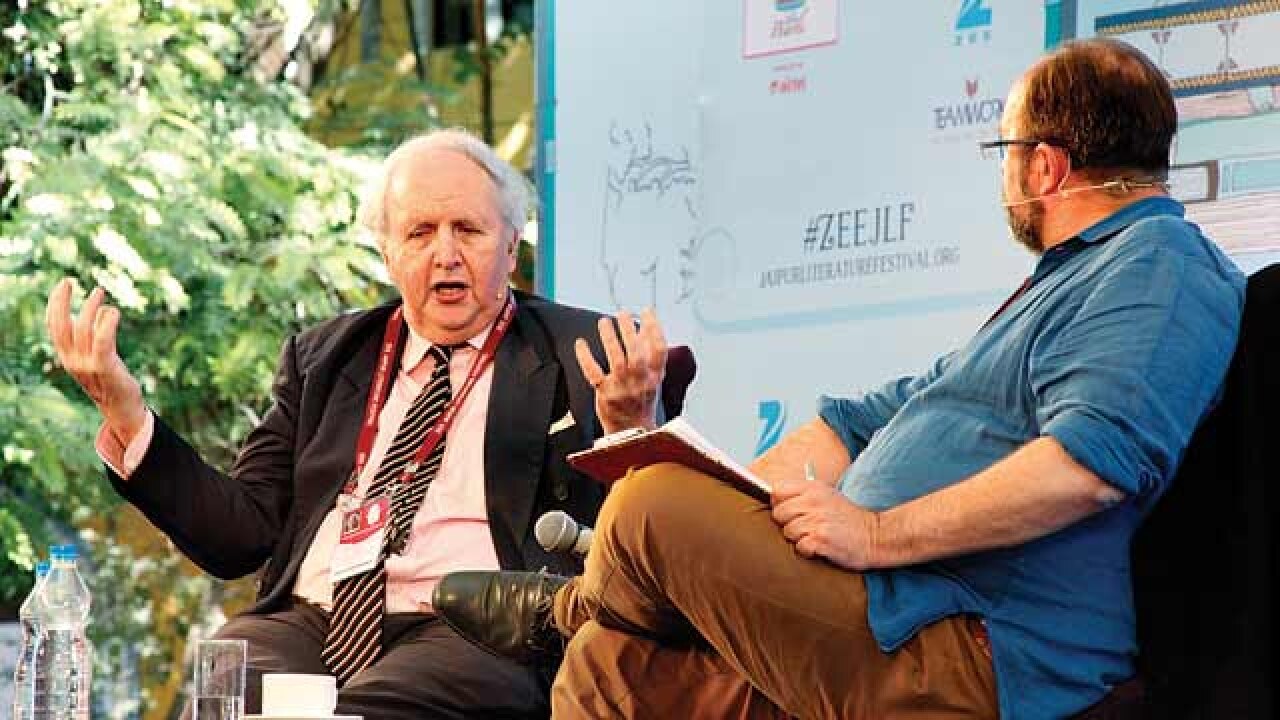
The No. 1 Ladies Detective Series may be set in Botswana, but if its reach is anything to go by – over twenty million copies and translations in 26 languages – its protagonist Precious 'Mma' Ramotswe has found many a home in bookshelves worldwide
But this series, pivoted around the African nation's only female private detective, isn't the only gift bestowed on readers by author Alexander McCall Smith. His 44 Scotland Street, Sunday Philosophy Club and Professor Dr von Igelfeld Entertainments, series has as passionate, if not as many, readers as the Mma Ramotswe books.
And so, it comes as no surprise that his session at this year's ZEE Jaipur Literature Festival, 'The Minor Adjustment Beauty Salon', was packed to the rafters and drew many laughs as the 67-year-old regaled delegates with stories about driving a tractor in Italy, penning an opera called The Okavango Macbeth (Macbeth, but with baboons) and playing the bassoon for The Really Terrible Orchestra ("We're so bad that on one occasion, the conductor had to stop us since one section of the orchestra was playing an entirely different tune").
"I started writing fiction – children's books in particular – by accident, through a competition by Chambers Dictionary. I'd written a novel for adults, but won the children's category," he guffawed.
When asked who inspired the colourful character of Mma Ramotswe, McCall Smith recalled his time in Botswana, revealing that Ramotswe is "a composite of many Batswana women".
"In 1996, I wrote what I thought would be a short story. But I realised I'd grown to like the character, and decided to make it a series," he revealed. Edited excerpts from an interview with the best-selling author:
Before becoming a novelist, you wrote academic books like The Forensic Aspects of Sleep. On that note, is there anything that gives you sleepless nights?
(Laughs) Not really. I suppose in the past, but you get to a stage in life when you realise there's not much point in losing sleep, and not everything is in your control.
You're often asked who the inspiration for Mma Ramotswe was, but who are the real people you've brought into 44 Scotland Street and The Sunday Philosophy Club?
In the Scotland Street books in which Bertie appears, there are a number of real people I know. Those in public life in Edinburgh – where I live – some well-known ones, and even friends. One of them who often appears in my books runs an art gallery. And he's fine with that (laughs).
Readers quite like the idea of real people inspiring fictional people. Somehow, it makes the story more real to them.
There's a sense of resonance in knowing such people really exist.
Absolutely, and maybe it adds to the credibility of the story you tell.
In the session, you said something drastic would never happen to Mma Ramotswe, because the character 'belongs to readers'. How hard is it to lose some ownership of characters you create?
Readers invest so much emotional energy in characters. And that does impose certain obligations. As an author, you're not harming a real person by bringing harm in the way of a fictional one. But I recognise there are implications. Readers would be very distressed if something happened to Mma Ramotswe.
That said, I do have control. I just acknowledge the interests of others. And I don't find that too difficult. Other writers have, however, disposed off main characters. As Arthur Conan Doyle did with Sherlock Holmes – before bringing him back.
How has Botswana changed from the time you lived there until now?
I think there's some erosion of what were deemed Botswana's values, traditions…
And a sense of community?
Yes, that happens everywhere, whether in Scotland or India. The modern world liberates people and offers more possibilities, but it also takes away a sense of belonging, ties that bind. This has happened to some extent in Botswana too.
Have you come across any female detectives in Gaborone?
(Laughs) I don't think there are any.
You once said you were anxious about how the Botswana people would react to your books since you were an 'outsider'. Does being one hinder your writing about a certain society or culture?
Interesting question. The thing is, I'm not writing critically about society. If I were, I'd have to be very careful, because people would inevitably resent that. So I write in a more affirmative way.
I'm also not a great deal concerned with portraying distress and problems. But it's not that I don't acknowledge that.
There's enough of the bleak stuff already.
Indeed, and also, there are others who are far better at that than I am. There's a world for books that look at the bleak side of life, and those that are written in a more positive vein.
There should be more books that dwell on the positive and possibilities. If we didn't have that, we would be unable to temper our harsh reality.
You once said The No. 1 Ladies Detective Agency is positive, not social realism. Yet, some observations Mma Ramotswe makes — about domestic abuse, and the ones her father makes, about colonialism… you are commenting on society through her.
Because I believe you can do that with a very light touch. In fact, you can make more profound statements with such treatment.
You're a big fan of RK Narayan.
Ah, Malgudi Days is an absolute delight. Narayan was a universal writer who wrote about simple things in life and the human condition. I have great respect for his work. And he hasn't dated. His literature is still evergreen.